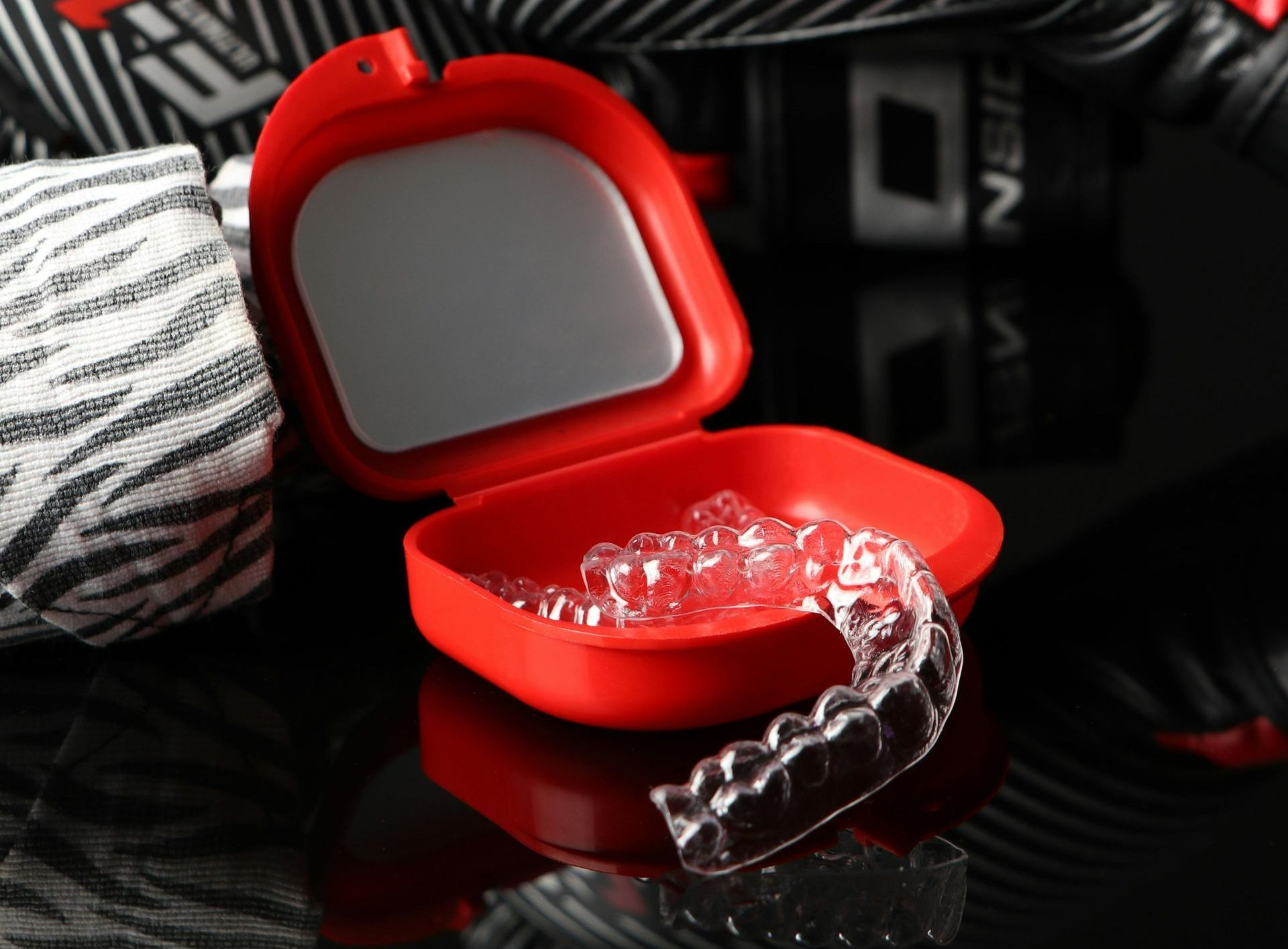
If you wake up with a sore jaw, headaches, or notice that your teeth are worn down, you may be unknowingly clenching or grinding your teeth at night—a condition known as bruxism. This common issue can lead to a variety of dental problems, but the good news is that a simple solution, known as a night guard, can help protect your teeth and alleviate the symptoms associated with bruxism.
In this blog, we’ll explore the signs that indicate you may need a night guard, the benefits of wearing one, and how it can improve your oral health and overall well-being.

What Is a Night Guard?
A night guard is a protective dental device made from soft or hard materials, designed to be worn over your teeth while you sleep. It creates a cushion between your upper and lower teeth, preventing them from grinding against each other. Night guards are typically custom-made by a dentist to ensure a comfortable fit and effective protection for your teeth.
Night guards are most commonly used to treat bruxism (teeth grinding and clenching), but they can also help with conditions like temporomandibular joint disorder (TMJ), which can cause pain in the jaw and face.
Signs You Might Need a Night Guard
Not everyone is aware that they grind their teeth at night, as the condition often goes unnoticed until symptoms arise. Here are some common signs that you may need a night guard:
1. Jaw Pain or Stiffness
Waking up with a sore or stiff jaw is one of the most common signs of nighttime teeth grinding. Clenching your jaw muscles while you sleep can lead to tension, making your jaw feel tight or painful in the morning.
2. Frequent Headaches
Persistent morning headaches, particularly around the temples, can be a sign of bruxism. The tension caused by grinding or clenching your teeth can radiate to the muscles in your head, leading to frequent headaches.
3. Worn or Flattened Teeth
If you’ve noticed that your teeth are becoming worn down, flattened, or chipped, it’s a strong indication that you’re grinding your teeth at night. Over time, this grinding can erode the enamel, leading to tooth sensitivity and increasing the risk of cavities or fractures.
4. Tooth Sensitivity
Grinding your teeth can wear away the protective enamel, exposing the underlying dentin and making your teeth more sensitive to hot, cold, or sweet foods and drinks. If your teeth are unusually sensitive, it could be due to bruxism.
5. Damage to Dental Work
If you’ve had dental work done, such as fillings, crowns, or veneers, and notice that they are getting damaged or coming loose, teeth grinding could be the culprit. A night guard can protect both your natural teeth and dental restorations from further damage.
6. Disrupted Sleep
Teeth grinding or clenching can lead to restless or disrupted sleep. If you find yourself waking up frequently during the night or feel fatigued during the day despite getting enough sleep, bruxism could be affecting your sleep quality.
7. Noise from Teeth Grinding
In some cases, teeth grinding can be loud enough to disturb a partner’s sleep. If someone has mentioned hearing grinding or clenching sounds coming from you while you sleep, it’s worth considering a night guard.
Benefits of Wearing a Night Guard
Wearing a night guard offers several benefits beyond protecting your teeth from grinding and clenching. Here’s how a night guard can improve your oral health and overall well-being:
1. Prevents Tooth Damage
The primary benefit of a night guard is that it protects your teeth from the wear and tear caused by grinding. Without a night guard, bruxism can lead to significant tooth damage over time, including enamel erosion, chips, and fractures. By creating a barrier between your upper and lower teeth, a night guard reduces the impact of grinding and helps maintain the integrity of your teeth.
2. Reduces Jaw Pain and Tension
Night guards are designed to relieve the pressure on your jaw muscles caused by clenching and grinding. By easing this tension, a night guard can reduce or eliminate jaw pain and discomfort, making it easier to wake up without stiffness or soreness.
3. Alleviates Headaches
Many people who suffer from bruxism experience tension headaches as a result of the strain on their jaw muscles. Wearing a night guard can reduce this strain, helping to prevent or reduce the frequency of headaches.
4. Improves Sleep Quality
Bruxism can disrupt your sleep by causing discomfort, jaw pain, or tension. A night guard can help you achieve a more restful night’s sleep by addressing the underlying cause of these issues, allowing you to wake up feeling more refreshed.
5. Protects Dental Work
If you have fillings, crowns, or other dental restorations, a night guard can help protect these investments. Grinding can damage or wear down dental work over time, but a night guard provides a protective barrier that reduces the risk of breakage or loosening.
6. Prevents TMJ Disorders
Temporomandibular joint (TMJ) disorders are often caused or aggravated by bruxism. Wearing a night guard helps reduce the pressure on the TMJ, alleviating symptoms such as jaw pain, clicking, and difficulty chewing.
Types of Night Guards
There are several types of night guards available, and your dentist can help determine which one is best suited to your needs:
1. Soft Night Guards
Soft night guards are made from a flexible material that is comfortable to wear. They are typically recommended for people with mild bruxism or clenching. While soft night guards are less durable than hard guards, they offer a comfortable solution for light teeth grinding.
2. Dual Laminate Night Guards
Dual laminate night guards have a soft inner layer for comfort and a hard outer layer for durability. They are designed for moderate to severe teeth grinders and provide a good balance between comfort and protection.
3. Hard Night Guards
Hard night guards are made from a rigid, durable material and are ideal for people with severe bruxism or TMJ disorders. These guards are custom-made to fit your teeth and provide the highest level of protection. While they may take some time to get used to, they offer long-lasting protection for heavy grinders.
4. Over-the-Counter Night Guards
Over-the-counter night guards are pre-made and available at most drugstores. While they are inexpensive and convenient, they are less effective than custom-made night guards because they are not tailored to your specific bite. They may feel bulky or uncomfortable and may not offer the same level of protection.
When to See a Dentist
If you suspect that you’re grinding your teeth at night or have noticed any of the signs mentioned above, it’s important to visit your dentist. They can examine your teeth, assess the severity of your bruxism, and recommend the best type of night guard for your situation.
Custom-made night guards from your dentist are more effective than store-bought options because they are specifically designed to fit your mouth and provide the right level of protection.
Final Thoughts
A night guard is a simple and effective solution for people who grind or clench their teeth at night. Not only does it protect your teeth from damage, but it also reduces jaw pain, prevents headaches, and improves sleep quality. If you’re experiencing any symptoms of bruxism, don’t wait until your teeth are damaged—talk to your dentist about whether a night guard is right for you.
By wearing a night guard, you can protect your teeth and enjoy a more comfortable, restful sleep.
You might like these posts
Stay inspired
Be the first to receive exclusive dental care insights and updates from Oral Insight. Don’t worry, we won’t flood your inbox!
Contact Us
We will get back to you as soon as possible.
Please try again later.